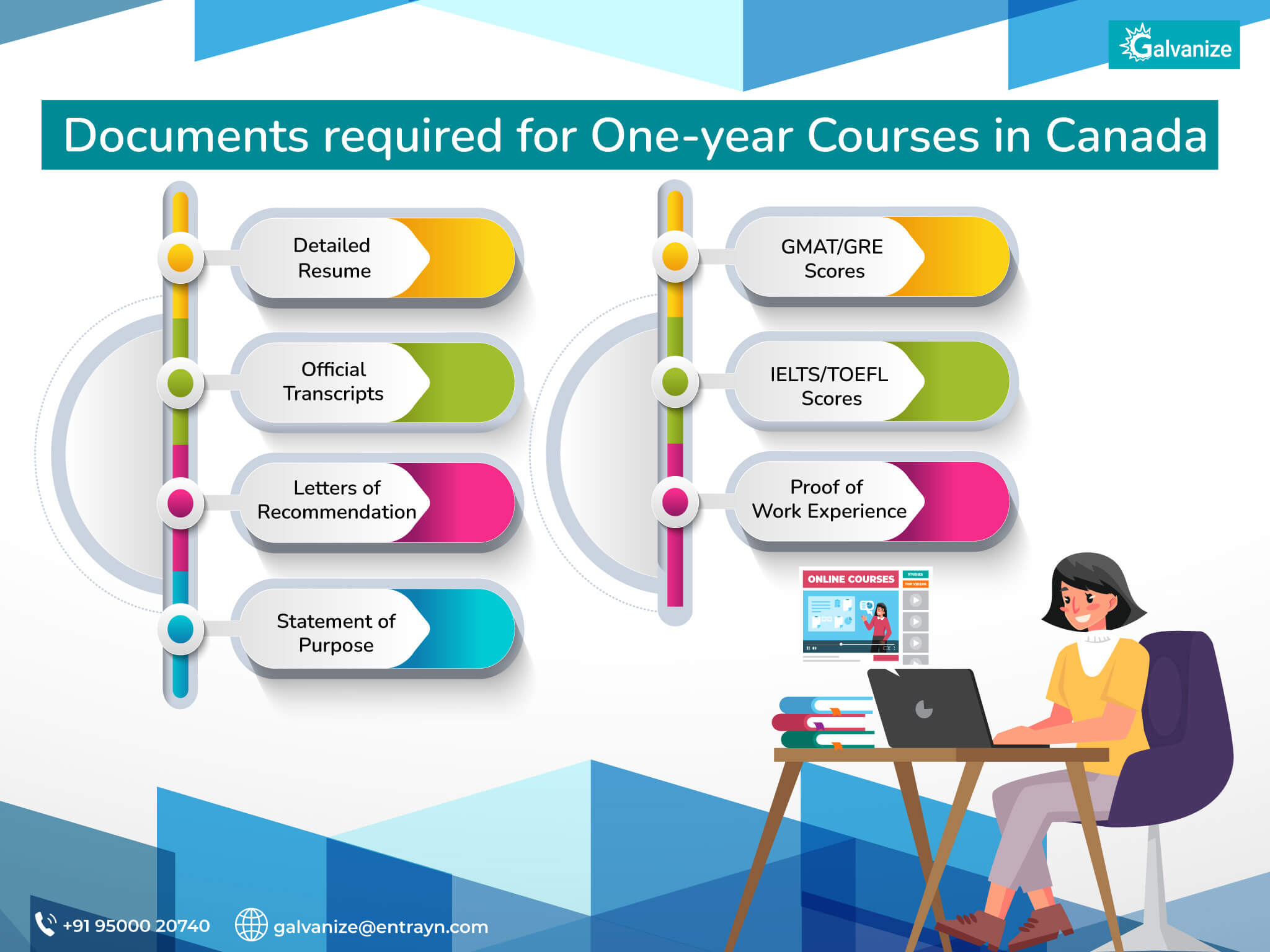
A Complete Guide To
One Year Courses in Canada | Popular Courses & Top Universities
Chapter 1
Overview
For many individuals, pursuing a 4-year or 3-year course abroad after a certain point of time in their lives may be unfeasible. This is why many students opt for 1-year or 2-year courses so that they may obtain knowledge and education which is more industry and goal-specific. One-year Courses in Canada are an excellent option for those who identify with the points mentioned above.
Before we move onto the crux of the article, let us look at why Canada is an excellent place to study and pursue your education in:
Why Study in Canada :
- Canada is the 10th largest economy in the world – With an output of 1.4 trillion, Canada overtook Russia to claim a spot in the top 10 economies of the world. Its economy is heavily service-oriented, with 78.9% of Canadians working in the service sector. As a country with abundant natural resources, its goods and manufacturing sector, have witnessed steady growth over the decades.
- You will be able to find a job – The first point described the Canadian Economy. From business management, STEM job-roles and service-related jobs to the labour industry, Canada offers plenty of jobs at hand. It has several programmes at hand for prospective immigrants looking to migrate to this country. These programmes are also designed to lead to Permanent Residence. Tech and IT related roles are growing exponentially as well. Check out this page for more information on Canadian Provincial Nominee Programs or PNPs.
- World-class education system – Canada is the world’s most educated country, and its public education system has been hailed as one of the best in the world. It hosts some of the world’s top universities such as – the University of Toronto, McGill University and the University of British Columbia. The Universities offer various courses and are a superb pathway to living in Canada. Check out this page for details about studying in Canada! Also, secondary education is free in Canada.
- Universal Healthcare – Canada offers exceptional healthcare for its citizens and residents, where essential healthcare is covered at no cost. The healthcare system is paid for by taxes, and public health insurance systems. Most provinces and territories also provide free emergency medical services, which should be a norm in most countries.
- It’s a safe and inclusive country – With adequate representation between genders, voices from minorities and support for the LGBTQAI+ community. The country embraces various cultures, with diverse cities such as Montreal, Toronto, Ontario and Vancouver. Its citizens feel safe and peaceful. : )
- Better work-life balance for its citizens – With a high minimum wage, remote working opportunities, a 40-hour work week and parental and cultural leaves, you will be able to manage a fine work-life balance in Canada.
- Canada is beautiful – It has some of the most beautiful locations and environment friendly practices you may have seen. There are plenty of parks, forests, coasts and water bodies, offering various outdoor activities such as ice skating, canoeing, surfing, hiking and ice hockey! It is the second largest country in the world, with plenty of space for everyone to explore and have adventures in!
- Low crime rates compared to many developed countries – We know that no country is perfect, but a higher probability of safety is always welcoming. Stay vigilant, stay safe!
- Canada has a true, democratic political system – Their political system is liberal, and they are trying their best to improve the country on all spheres. They hold themselves accountable for their mistakes and are run by a diverse panel of individuals from different cultures. Despite the atrocities of colonized countries, Canada has come farther than the USA or the UK in atoning for the sins of their ancestors.
- Plenty of top Canadian Programs are renowned and recognised worldwide, with more than 10 of its universities featuring in the top 150 universities in the World. Business Management – Head over to this blog for learning about the best b-schools in Canada. Finance – Canada is well known for its well-established educational programs in Finance. Computer Science and IT. Engineering. Digital Media and Journalism. Health and Medicine. The Great North is certainly expensive to live in, but the minimum wage, excellent post-study VISA and quality of life in Canada, coupled with the best education available, make it a good choice in the long run.
- Canada is cold – Canada is one of the best places to live in for those who love the snows. Let’s face it, it is much more preferable to live in the cold and get warm, than live in hot climates and try to get cold. The unique culture that has stemmed from Canada is attributed to a lot of its culture. You’ll learn not only to survive, but thrive in the cold. Hot cocoa anyone?
Let us now look at various One-Year Courses in Canada, and explore the nuances related to these courses.
Chapter 2
One-year Courses in Canada :
As mentioned earlier, one-year courses in Canada are excellent, time-saving alternatives for many students who wish to opt for 1-year or 2-year courses so that they may obtain knowledge and education which is more industry and goal-specific. These courses are also more affordable due to their shorter duration, and have less stringent admissions criteria. The skill-sets taught in these courses are highly industry and career-oriented.
Most of the top one-year courses in Canada that are also feasible are the Diploma Courses in Canada or the Certificate Courses. These Diploma Courses fit the criteria for the above 1-year courses in the sense that they are also industry-oriented and specialise in in-depth knowledge about a particular subject. Those who wish to obtain PR or Express Entry may have to apply for UG or Diploma courses that are more in accordance with these goals. Select the right option for you based on your own research!
The subjects for one-year courses in Canada or Diploma Courses in Canada include but are not limited to:
- IT and Networking
- Business and Management
- Engineering
- Arts
- Customer Service
- Human Resources
Admission Criteria for One-year Courses in Canada :
We will cover the individual Eligibility Criteria for One-year Courses in Canada in the upcoming sections, but first, let us look at the general criteria:
- Work Experience – A minimum of 2 years’ worth of relevant work experience is usually required for Canadian Universities.
- IELTS/TOEFL – In order to prove your proficiency in the English Language, you must achieve a band 7 in IELTS or a general score of 100 in the TOEFL.
- A relevant UG – A UG degree with a minimum GPA of 3.3 – 3.5 / 4.
- GMAT/GRE – Most Canadian Diploma and One-year Courses require you to take these standardized tests with certain minimum score requirements.
Documents required for One-year Courses in Canada :
These documents are fairly common for all programs abroad. We will make a short list of the same –
- Detailed Resume – This should contain your academic and professional qualifications in a concise, organised manner.
- Official Transcripts – Scanned.
- Letters of Recommendation – You will need at least 2 LORs from your previous employer and university.
- Statement of Purpose – This one can make all the difference in the world when it comes to your selection. You need to express your goals and explain why you should be considered for this program.
- GMAT/GRE Scores – This one is fairly obvious.
- IELTS/TOEFL Scores – Again, fairly obvious. 😛
- Proof of Work Experience – 2 years minimum.
- As you progress, you will need your VISA and other relevant permits for the same.
Popular One-year Courses in Canada :
Plenty of the top and popular one-year courses in Canada aren’t just Diploma Courses. There are plenty of Master’s Courses and Certificate Courses that fall into the one-year category as well.
One-year PG Diploma Courses in Canada:
- Accounting, Finance
- IR & Computer Science
- Engineering
- Nursing, Pharmacology, Midwifery
- Marketing, Advertising
- Education & Teaching
- Film & TV
- Digital Marketing
- Cyber Security
One-year Master’s Courses in Canada:
- MBA
- MA History
- MA Mathematics
- MA Gender Studies
- MA Sociology
- MSc Computer Science
- MSc Engineering
- MSc Psychology
- MSc Finance
Certificate Courses in Canada:
- Certificate in Sales & Marketing
- Certificate in Business
- Certificate in Accounting
- Certificate in Web Design
- Certificate in HR
- Certificate in Flight Attending
- Certificate in Media and Communications
Top Universities in Canada for 1-year Courses :
- McGill University
- Simon Fraser University
- Queen’s University
- Western University
- Centennial College
- Sault College
- Desautels Faculty of Management
- Nova Scotia Community College
- University of Manitoba
- Humber College
- Durham College
- Lambton College
Cost of Living in Canada
Obviously, the cost of living will vary according to the city you are studying in, and the university in which you are studying, but there are some basic living expenses that can be generalised, in order to get an idea of what the cost of living will be like. Let us look at that now.
- Internet – 3k to 5k INR per month.
- Utilities – 12k to 24k INR per month.
- Accommodation’s – 25k to 60k per month. (These will vary depending on whether you choose university homestay or a private, shared apartment.)
- Clothing – Around 2k per month (Varies widely).
- Basic Entertainment – Around 10k per month.
- Food and Drinks – Around 25 – 30k per month.
Right off the bat, it becomes quite obvious that you need to get a part-time job, so definitely go for one. The minimum wage in Canada is around 1k per hour. If you work part-time, you can definitely cover your cost of living. If you’re worried about your Cost of Living, go for shared spaces and don’t worry, for you will be able to pay everything back after your degree.
Quality of living and life is high in Canada, and there’s lot to explore and do.
Enjoy the Great North! To know more about Express Entry in Canada, click here. To know about B-schools in Canada, visit this page!
Best Wishes from Galvanize!
Written by Saahil R Bhatt.
Guided by Pavitra Srinivasan and the Galvanize In-house Experts











